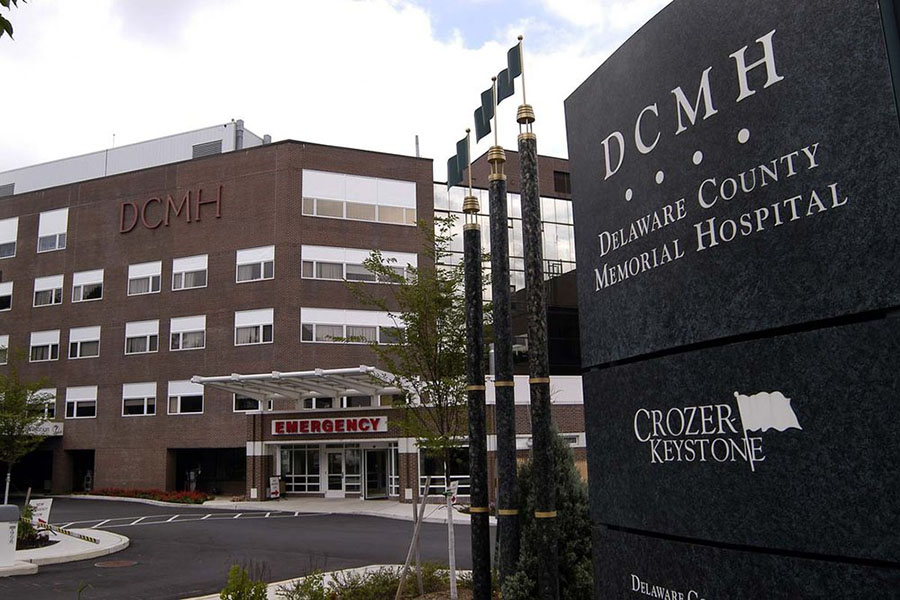Dr. Sherman Leis, a pioneer of gender-affirmation surgery for trans people, has joined Delaware County Memorial Hospital, an Upper Darby institution that is part of the Crozer-Keystone health system, as an attending surgeon.
Leis founded The Philadelphia Center for Transgender Surgery, in Bala Cynwyd, which has specialists including surgeons, psychologists, endocrinologists, aestheticians, speech therapists, legal experts and others. Starting this month, suture removal, consultations, pre-operative appointments and post-operative care for trans patients will take place at his practice, and surgeries will be performed at the Memorial Hospital.
Leis is excited to join the institution because it has a “forward-thinking, progressive mindset,” he told PGN. Hospital officials want to start a transgender surgery fellowship, Leis added, which would give him the opportunity to work with medical residents and expand available services.
After the closure of Hahnemann Hospital, which was the first Greater Philadelphia area hospital to offer a specialty in transgender surgery, Delaware County Memorial Hospital staff hope to “become the region’s leader in treating transgender patients,” Leis said. At the same time, Hahnemann’s Dr. Kathy Rumer — who trained under Leis — has joined Thomas Jefferson University Hospital and, in June, Rumer told PGN that Jefferson will open a “multi-disciplinary gender center” next year.
Gender-affirmation surgeries offered by Leis include facial feminization, breast augmentation, vaginoplasty, buttock enhancement and thyroid cartilage reduction. Other procedures include chest masculinization, phalloplasty, metoidioplasty, clitoral release and buttock reduction. Due to complications and scarring, Leis said he typically does not perform urethral lengthening.
In a 2017 article, the medical journal Plastic and Reconstructive Surgery reported that of 224 people who underwent phalloplasty, urethral complications occurred in 27 percent of patients with vaginectomy and 67 percent with vaginal preservation.
“In the next few years, if newer methods provide a lower rate of complication, I will perform the surgery,” Leis said. “But now I prefer not to. The risk is too high.”
Leis added that “99 percent” of surgeries he performs are facial feminization, of which he said he has completed “thousands.” He also told PGN he has done “two times” the amount of masculizing chest surgeries — approximately 4,000 — as he has breast augmentations, explaining that estrogen can create a feminine chest, though at different degrees for different women. Additionally, he has performed “800-1,000 vaginoplasties” versus “80-100 phalloplasties” over a long career.
Leis said he completed his first gender-affirmation surgery 35 years ago, but it was a resident’s suggestion decades later that lead him to the specialty. “About 15 years ago, a resident of mine was a trans woman, and she encouraged me to pursue a specialty in transgender surgery. Until then, I did plastic surgery more generally.”
Leis quickly realized it was a passion of his and dedicated himself to the work. His practice grew, and he’s been busy for years with patients locally, regionally, nationally and internationally. “When you treat your patients with care and respect, news travels,” he said.
“I deeply care about being able to change peoples’ lives,” Leis added. “I care about my patients and give them a great deal of attention and quality care. I don’t think there’s another job in the world that has the ability to make such a profound impact on a person’s life like transgender surgery does.”
Leis joined the hospital’s team Sept. 20 and performed his first surgery during his inaugural week. He will complete his first gender-affirmation surgery on Oct. 11 with patient Sharon Hult*, who described Leis as “very informative” and “very nourishing.”
“There were many times when I didn’t have the support or help that I needed, and he’s the type of doctor that will go out of his way to pick you up or make arrangements if you need a ride to the hospital or aftercare,” Hult said. “He’s very hands-on. He’s going to make sure that you are taken care of. He’s made me, in a sense, trust him that he’s going to be there. He’s not going to disappear, and that shows his character. He’s very passionate about his work and very caring, which he shows through his actions.”
Out-of-town patients who need extended care can stay in apartments located above Leis’ Bala Cynwyd office.
Leis said he likes having the patients close because he “can check in on them and see how they’re doing.”
Hult said she heard about Leis through “word of mouth” and reviews that pay homage to his extensive experience. “I had a friend, and she went to him and had really good reviews. We did a consultation, and I wanted to proceed through. It’s been a journey.”
Of that journey, Hult said, “I just had a vision of my future and my life and what I wanted it to be. I knew living as I am isn’t acceptable fo me. I knew I needed to do my research by any means possible to alleviate the challenges, discomforts and pain that I felt, and that meant working hard, being motivated to fight and get things done. That’s not every girl’s journey, but it’s mine, and I’m here to stay.”
She added that she had “many sleepless nights, lots of prayers and crying and outcasting and isolation.”
“I encourage anyone to do what you can and keep pushing,” Hult said, “because you can cross that line and break barriers and move mountains, and I’ve done it.”
*Name has been changed to protect the medical privacy of a source.
